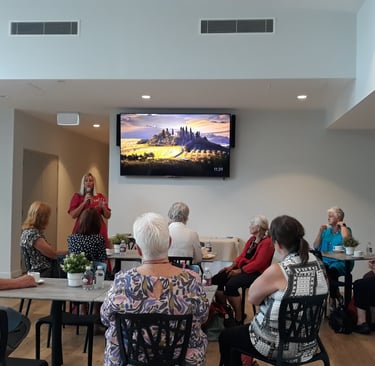Why Death, Funeral & Grief Literacy is important
In a society that often avoids conversations about death, many people find themselves unprepared when loss inevitably touches their lives. At Griefscape, we believe that death, funeral, and grief literacy are essential skills that should be fostered at every stage of life. Understanding these topics helps individuals and communities navigate loss with resilience, empathy, and connection. Read More >>
Gina Connolly
2/21/20251 min read


Embracing Grief Literacy: A Skill for Life
In a society that often sidesteps conversations about death, many people find themselves unprepared when loss inevitably touches their lives.
At Griefscape, we believe that death, funeral, and grief literacy are essential skills that should be fostered at every stage of life. Understanding these topics empowers individuals and communities to navigate loss with resilience, empathy, and connection.
Breaking the Silence
Avoiding discussions about death does not protect us—it leaves us vulnerable when loss occurs. By normalising conversations about end-of-life, we reduce fear, ease decision-making, and create space for meaningful rituals and remembrance. Talking about death should not be reserved for moments of crisis; instead, it should be woven into our cultural fabric, allowing us to approach loss with greater confidence and care.
Why It Matters for All Ages
For Children & Young People – Early education about loss and grief helps children develop healthy coping skills, reducing anxiety and confusion when faced with death. It also teaches them how to support others with empathy. When we introduce grief literacy in age-appropriate ways, we foster emotional intelligence that serves them throughout their lives.
For Adults – Understanding grief allows individuals to make informed choices about end-of-life planning, funerals, and support systems. It also equips them to support grieving friends, family, and colleagues with compassion. Normalising these conversations ensures that when loss occurs, the practical and emotional aspects of grief feel less overwhelming.
For Elderly Individuals – Engaging in open discussions about mortality helps older adults feel heard, respected, and empowered to share their wishes. This fosters peace of mind for both them and their loved ones, ensuring that their end-of-life decisions align with their values and are honoured.
Strengthening Communities Through Literacy
When grief literacy is embedded into our culture, individuals feel more confident supporting one another. Funerals and memorials become moments of connection rather than logistical burdens, and we recognise the vital role these rituals play in the grieving process.
By prioritising death, funeral, and grief literacy at all ages, we create a society that embraces the reality of loss with courage, compassion, and understanding - ensuring no one has to grieve alone.
.
Follow on Socials
Guiding organisations through the journey of grief.
Support
Connect
hello@griefscape.com.au
0422 222 964
© 2025 GRIEFSCAPE All rights reserved.
Griefscape acknowledges the Traditional Custodians of the land on which we operate, live and gather as employees, and recognise their continuing connection to land, water and community. We pay respect to Elders past, present and emerging.
We also respectfully acknowledge that each person's journey in the landscape of Grief is unique and valued.
Disclaimer: The information provided on this website and in all Griefscape communication is for educational and professional development purposes only. It is not intended to be a substitute for professional counselling, medical advice, diagnosis, or treatment. If you are experiencing personal concerns or require support, please seek assistance from a licensed counsellor, psychologist, or general practitioner.


